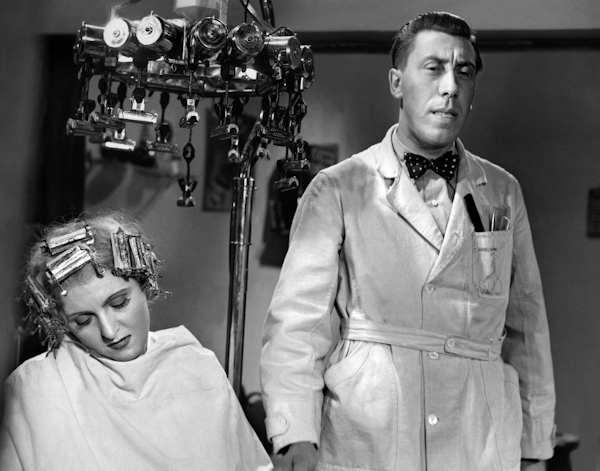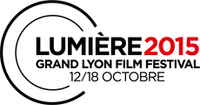Dance Program, by Julien Duvivier
PostED ON 15.10.2015 AT 11:59AM
Duvivier doesn't have a style. On second thought, yes he does. He has all the styles, but it annoys the hell out of him to have to settle on just one. He also says he has no memory, which required him to take notes, make cards. Like Raymond Chirat. Raymond, the science, Raymond, the passion. A guy like that should never die. The first time Raymond took notes was, coincidentally, during the screening of Dance Program by Duvivier. The year was 1937. From that day forward, he'd take notes on everything having to do with the films, the producers, the directors, the actors... he would become inexhaustible and indispensable to the education of any serious cinephile. Better than a beacon, a lighthouse. He has just left us, is this world for real?

With Duvivier, what interests me is to go from one style to another: from psychological dramas (David Golder), to crime thrillers (Tête d'un homme), from colonial chronicles (Escape from Yesterday), to exotic melodramas (Pépé le Moko) or social sagas (They were Five)... so many gems covered in soot, darkness being the trademark of the man. Dance Program takes a step further, moving from one style to another within the same film! In doing so, he invents the film à sketches. Hollywood (Joseph Manckiewicz comes to mind) will owe him a certain debt. How does one define the default style of such a filmmaker? Again, we get lost in conjecture, as the man seems to be a living oxymoron: Popular and misanthropic, technician and poet, atheist and author of a crucifixion, sentimental and cruel, craftsman and artist, French and multilingual; Julien Duvivier deploys his little theater of cruelty, irrespective of the genre, with a recurring theme: his basic pessimism about mankind. As such a Dance Program is a bitter movie, sad, disillusioned, openly gloomy.
Yet, presented at the Venice Film Festival in the summer of 1937, it won the Mussolini Cup for best foreign film, beating the polite Jean Renoir and his Great Illusion! How, though? First, a stellar cast. Not so much because of the women (Marie Bell and her stuffy acting lays the sentimentality on thick; Françoise Rosay, peroxided and jetlagged seems to have smoked a whole missal) - but rather for the gentlemen. Judge for yourself: Harry Baur, Raimu, Louis Jouvet, Fernandel, Pierre Blanchar, Pierre Richard Willm (#checkoutmyjacquardsweater) and you get the idea! All that are missing are Gabin and Michel Simon. (Duvivier would not have said no but, with Jeannot, there is a quarrel brewing...) And then there's the film's story: "Christine Surgère, idle, wealthy and recently widowed, lives in a beautiful house on Lake Garda. Rummaging through her things, she finds a book from her first ball, when she was only sixteen. The names of eight suitors, all of whom courted her, are written in the book. Nostalgic and depressed, she decides to find out what happened to them and goes in search of them."
And we're off! …for the long inventory of the male psyche in an aching, multi-assorted way. Meaning more or less unpleasantly sweet, more or less spicy. We go through some insipid performances and showing off, freewheeling, to say a word of the great Harry Baur, the mountain of groggy humanity that eventually gives birth to a mouse: he enters the orders to seek oblivion. In other more flamboyant news, Jouvet is a shady lawyer, who has become king of the night, fueled with champagne and meticulous cynicism. Enlisting his cabaret girls feathered for the image and platinum-blondes for the spice, while on the side he takes a group of well heeled girls on nocturnal escapades to an affluent suburb. …All the while multiplying the aphorisms and expanding its staccato flow. Stiff as a bodkin, he is about to be softened up by Christine, who brings up the Verlaine poem he recited to her as a young man: "In the old park's desolation and frost/The paths of two figures have crossed." This is the moment chosen by the constabulary to come put on the cuffs! A nobleman, he refuses that it be done in the presence of the lady. And another name crossed off in the book ... But the bravura performance is still to come.
Lucette Destouches remembers having gone with her husband to pay a friendly visit to Mary Bell during filming. Should they see a cause and effect that gives the sketch featuring Pierre Blanchar the blind abortionist doctor, a Celinian twist? Moreover, Julien Duvivier was one of the many in line racing to bring "Journey to the End of the Night" to the screen.
Seventh dance, Thierry Raynal, Impasse Capdenac, Marseille. His forehead beaded with Saigon sweat, the doctor walks the floor askew due to his feverish, uneven steps. He holds his head, hot as a boiling pot, between his neat hands and points a single eye toward this elegant troubling beauty. "Another angel passes!" he thinks. The walls echo the roar of the port and its cranes creak with animosity. We see them so close by the bay window, like surveillance cameras that would lose their heads while turning. An ageless woman, Gaby, brings Christine into the salon. A slob stuck with bed bugs in the place of eyes; once the camera seems to limp, she is seasick. Since Eisenstein, the Russian formalists or the German Expressionists, nobody had obliquely tilted the camera this way... Welles will use the same technique. Meanwhile, Caligari is on cannebière and it has its effect! While he is preparing his needles and compresses to treat her, she speaks of friendship. Who is this woman? His white ventriloquist chicken eye tries to decipher under the brim of her felt hat and then they sit on a sofa, to let us catch our breath.
(For a scene that begins as demented as this, kindly refer to the eruption of Klaus Kinski, aka Karl-Heinz Zimmer in That Important Thing Love (1975), when he tumbles down the spiral staircase of the Hotel Beaux Arts and drying his hair to the sound of the sublime "Derisory Ballade" by Georges Delerue).
"Ah, I've got it!" says Thierry. You were under my care once in Saigon, yes, but I seem to remember that everything went well? So? (...) Oh, well, enough riddles! I saw white, black, red, yellow faces... So madam, you understand! What do you want? Who are you?" Our Ferdinand Bardamu with the double-breasted jacket, then tries to calm his nerves and figure it out… She gives him hints like "youth" and "studies," talks to him about dancing... it then it hits him- he remembers. Immediately, he is self-conscious about the disgrace of his lost eye. He tells a tale of helping a Negro, deep in the bush, to which she gasps, "My poor friend!" And, acting like a wounded animal, he's found a way to tenderness. "Friend." "Friendship." These words are like a warm shower to him, a gesture of affection. Without vacillating, he regains hope, and takes her hands. Just an ember glow at the bottom of an extinct stove: "All I need is a tiny bit friendship!" He keeps checking at the end of each sentence to locate the shrew moving around in the kitchen that seems to have brought out old wickedness. Thierry has finally regained some self-esteem in this filthy furnished apartment. "A little friendship... yes, merely lost! Voilà! Could we perhaps see each other from time to time? - Of course - Write to one another! - Yes, often! - I don't know, perhaps read the same books! Ah, if only I were not so sad!" Rejuvenated, he insists she stay for lunch. As he goes to serve her wine, his hand shaking, he knocks the bottle over, and "malaria" is invited to the table. His sudden fit of madness makes him stagger in the salon like a dragnet swept out by storm. Gaby chases Christine out. It's over. Gaby says, "I'd give you hell, you and your damn childhood girlfriends!" The doctor is reduced to a huge, panting wreck. Hitting rock bottom in humiliation, he locks his prey inside the room. The croaking of the cranes eerily starts up again; the harbor whistles like the lid of a pressure cooker ready to fly open. He clings to his desk drawer, pulls out a pistol and loads it, shaking. Gaby becomes nothing but a screaming parrot in a cage that scrambles and bumps herself all over the apartment in a panic. He walks toward her, this time determined to put an end to the chaos. Cut. This segment of the film, watched one childhood evening (during the essential Au cinéma ce soir by Armand Panigel, every Thursday night, on the first television channel), turned out to be my own personal Fright Night!
It has been said that Duvivier does not make films, he makes dreams like nightmares. "Dance Program is like two dreams that collide: one from the past that she experienced in her youth with these men, and this nightmare of what they have become: living ghosts of those she knew long ago, like a dead dream."
"Genius is a word, the cinema is a profession," said Julien Duvivier. He is, however, a genius, who was always held in high esteem, including by Orson Welles himself.
Pierre Collier

